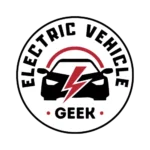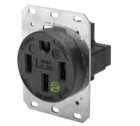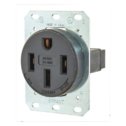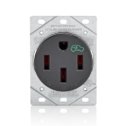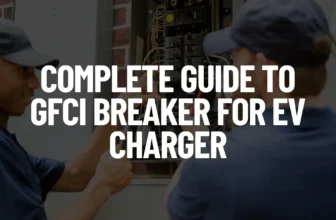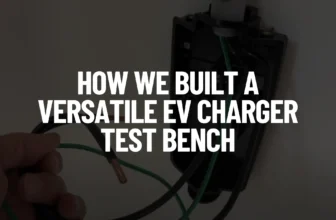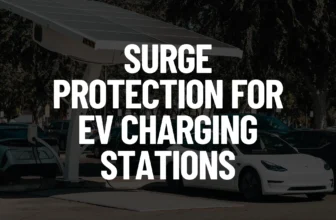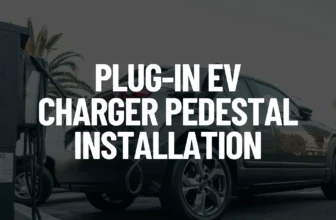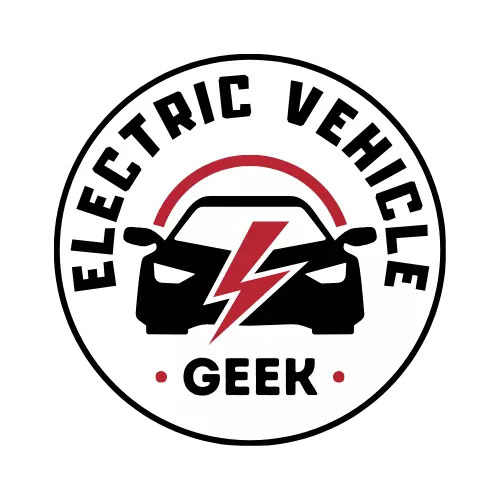Discover the best NEMA 14-50 outlet for Tesla charging, including detailed reviews of top options like Hubbell, Bryant, and Leviton. Learn about their performance, charging speed, pros, cons, and key features to make an informed decision for your home EV charging setup.
When selecting a NEMA 14-50 outlet for your Tesla, you want reliability, safety, and efficient charging speed. The following three outlets stand out for their performance, but each has its strengths and weaknesses. Let’s dive into the details.
Best NEMA 14-50 Outlet for Tesla
Here is a list of the best NEMA 14-50 outlets for Tesla that we recommend.
1. Hubbell NEMA 14-50 Receptacle
Hubbell 14-50 Outlet for Level 2 EV Charger Installation (Plug-In)
The Hubbell NEMA 14-50 is a high-performance car charger outlet frequently recommended for Tesla charging, making it a trusted choice for Level 2 EV charging. It is capable of handling 50 amps at 240 volts, offering a robust design that ensures long-lasting reliability. Its compliance with UL and CSA standards further supports its reputation as one of the most reliable options for home charging setups.
The Hubbell NEMA 14-50 features compatibility with wire sizes ranging from 10 to 4 AWG, with a 6 AWG copper wire being the recommended choice for optimal performance. Its durable thermoplastic construction ensures that it can withstand extreme conditions, functioning effectively in temperatures ranging from -40°C to 75°C. The outlet’s installation is straightforward, thanks to a simple screw and flush design that ensures ease of setup, even for DIYers.
Additionally, the outlet provides excellent insulation with a dielectric strength of 2,000 volts, enhancing safety during operation. When used for Tesla charging, it supports a maximum charging speed of 32 amps (7.7 kW), which translates to adding about 30 miles of range per hour for Tesla vehicles such as the Model S, Model 3, and Model Y. This makes the Hubbell NEMA 14-50 a reliable and efficient choice for home charging needs.
2. Bryant NEMA 14-50 Outlet
Bryant 14-50 Outlet for Level 2 EV Charger Installation (Plug-In)
The Bryant NEMA 14-50 outlet is designed for durability and efficiency, making it an excellent choice for Tesla owners who require long-term reliability. Constructed from heat-resistant thermoplastic polyester, it is built to handle continuous use, ensuring consistent performance even under heavy loads. This outlet is favored by users who prioritize dependable thermal management during extended charging sessions.
With an amperage rating of 50 amps and voltage support of 125/250V, the Bryant NEMA 14-50 can accommodate wire sizes from 10 AWG to 6 AWG, making it versatile for various electrical setups. Its heat-resistant material ensures that it remains cool during long charging sessions, maintaining safe and efficient operation.
The outlet is UL-listed and CSA-certified, guaranteeing compliance with safety standards. When used for Tesla charging, it supports a maximum charging speed of 32 amps (7.7 kW), allowing vehicles like the Tesla Model S, Model 3, and Model Y to gain approximately 30 miles of range per hour. This makes the Bryant NEMA 14-50 a reliable and efficient choice for home EV charging needs.
3. Leviton NEMA 14-50 Outlet
Leviton NEMA 14-50 Outlet for Level 2 EV Charger Installation (Plug-In)
The Leviton NEMA 14-50 outlet is a reliable and popular choice for Level 2 Tesla charging. Its simple design makes it an easy-to-install option for residential applications. Supporting 50 amps and 240 volts, it ensures a steady and safe connection for home EV charging needs.
The outlet is compatible with wire sizes up to 6 AWG for optimal performance, and its durable thermoplastic body and face ensure long-lasting reliability. It fits standard electrical boxes with a 2.15-inch diameter center hole, and all necessary mounting hardware is included. While installation is straightforward, beginners may find it challenging without prior experience.
The Leviton NEMA 14-50 outlet provides a charging speed of up to 32 amps (7.7 kW), adding approximately 30 miles of range per hour for Tesla Model S, Model 3, and Model Y. While the outlet is generally reliable, regular inspection is recommended for safety. Over time, the spring-loaded contacts may wear, potentially causing heating issues. If the outlet is not frequently plugged and unplugged, this risk is minimized, but periodic monitoring is still advised for optimal performance. Additionally, the Leviton outlet’s fiberglass insulators may melt over time, potentially compromising the outlet’s integrity.
Conclusion: Which is Best for Tesla Charging?
For optimal Tesla home charging, installing a NEMA 14-50 outlet downstream from a 60A GFCI breaker or a 2-pole, 50A, 240V AC breaker ensures safe and efficient Tesla charging.
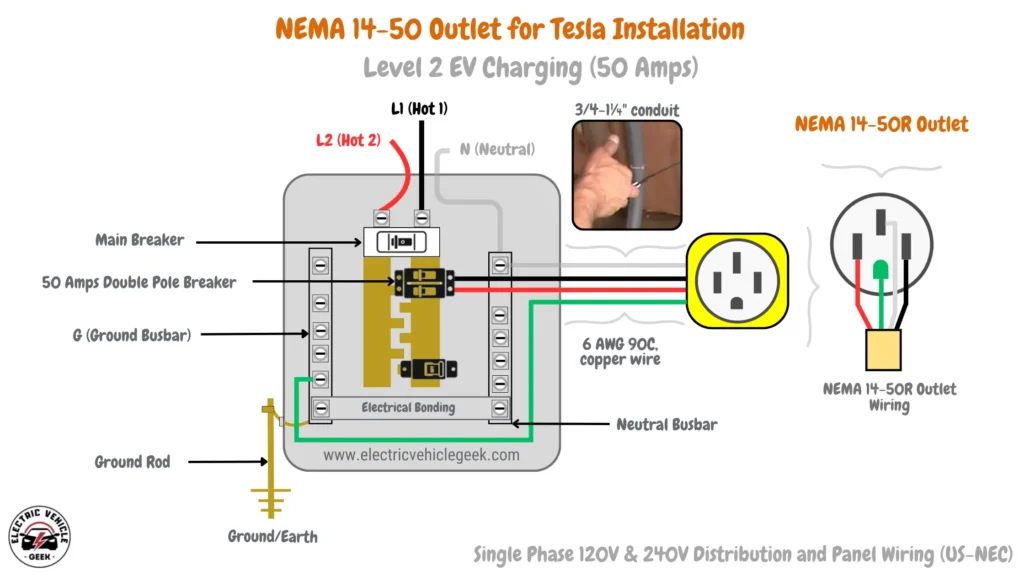
With a Tesla charging station at home, you can achieve up to 45 miles of range per hour with Level 2 charging at 240VAC, providing a fast and reliable solution for everyday charging needs.
- Hubbell NEMA 14-50: The best overall choice. It delivers consistent power, has excellent temperature resilience, and is easy to install. It may be slightly more expensive, but its reliability and safety features make it worth the investment.
- Bryant NEMA 14-50: Ideal for those who need excellent thermal performance. It stays cool under heavy load, making it a strong contender for regular charging needs. Its simple installation process makes it appealing to DIYers.
- Leviton NEMA 14-50: A great budget-friendly option with decent performance. It’s reliable for Tesla charging, but installation can be tricky, and the outlet may require more attention over time due to potential wear on the contacts.
All three outlets offer similar charging speeds (around 30 miles of range per hour for Tesla models), so your choice will depend on specific needs such as ease of installation, thermal performance, and budget.

James Ndungu is a certified EV charger installer with over five years of experience in EVSE selection, permitting, and installation. He holds advanced credentials, including certification from the Electric Vehicle Infrastructure Training Program (EVITP) and specialized training in EV charging equipment and installation, as well as diplomas in EV Technology and Engineering Fundamentals of EVs. Since 2021, James has tested dozens of EV chargers and accessories, sharing expert insights into the latest EV charging technologies.
